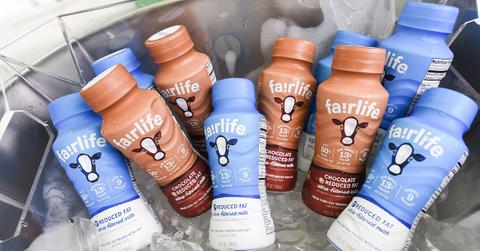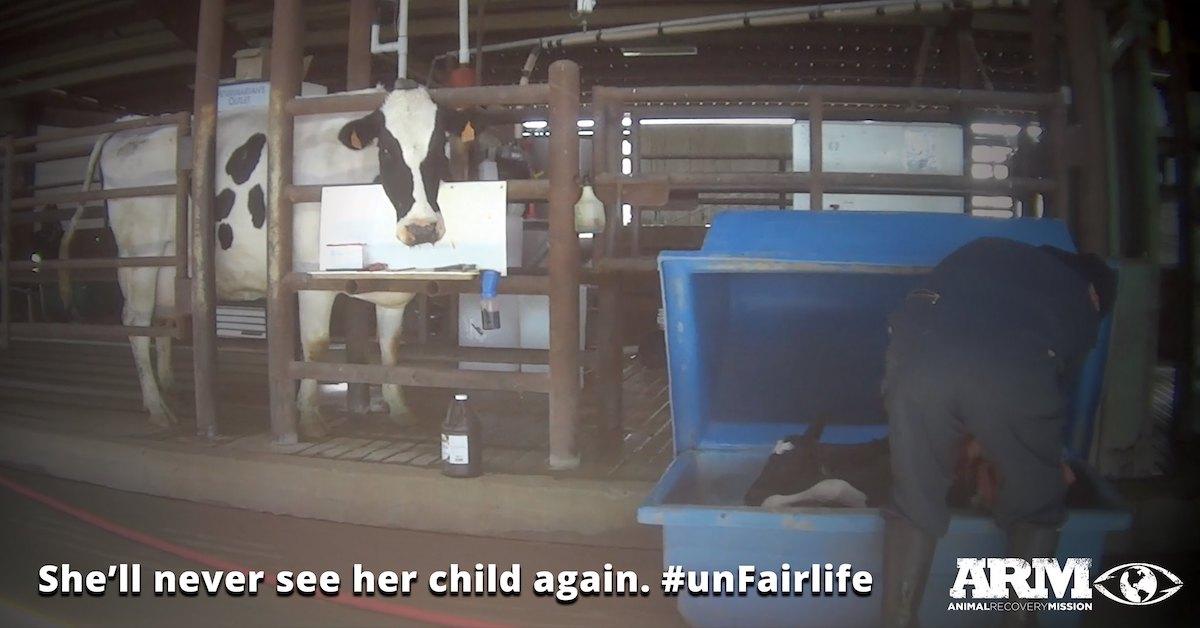How Does Fairlife Treat Cows? There's Still Good Reason to Boycott the Brand After Its Scandal
Published Nov. 30 2021, 1:09 p.m. ET

In 2019, undercover footage taken by an animal rights activist exposed Fair Oaks Farms, which supplies milk to dairy companies including Fairlife, revealed appalling evidence of animal abuse. In response, multiple stores stopped carrying Fairlife products, and numerous consumers boycotted the brand.
Several years on from the scandal, consumers are wondering how Fairlife treats cows in the wake of the scandal, and if Fairlife still abuses cows.
READ NEXT: These Artists Are Confronting the Climate Crisis With Their Work
Keep reading for a refresher on what went down, everything we know about Fairlife’s treatment of the cows, and for our guidance on easy ways to protest companies that treat animals unfairly.
Does Fairlife abuse cows? Here’s a summary of the 2019 scandal.
From February through April of 2019, an Animal Recovery Mission (ARM) activist got an undercover job milking cows at Fair Oaks Farms, which supplies milk to dairy companies including Fairlife (which is owned by the Coca-Cola Company, and provides milk to Chick-fil-A).
On June 12, 2019, ARM released a cut of the investigator’s footage documenting cruelty on the dairy farm, which was taken with a hidden body camera. The footage went viral, and the organization also published a 125-page document reporting what the activist witnessed — including “extreme and violent animal abuse” within the first few hours on the job.
“It was evident to the investigator that it was the normal way to do business” at the farm, the document read. As the two months went on, the undercover activist continually observed employees punching, hitting, poking, and shoving cows; he saw them snapping cows’ tails; and he watched them push, kick, and slap cows in their udders.
He also observed that immediately after giving birth, mother cows were separated from their newborn calves, who were placed into confined sheds, while the mothers were sent right back to the milking rotary, sometimes with their placentas still hanging out of their bodies.
The investigator also noted that in his entire time on the job, the cows received zero medical care, despite many of them suffering from visible injuries and infections. And, when cows died of sickness, their dead bodies were dumped outside out of the view of those attending Fair Oaks’ Dairy Adventure tours; and once cows could no longer produce milk, they were sent to slaughter for meat or dog food.
But this behavior was all observed nearly three years ago — so is it still happening?
How does Fairlife treat their cows after the controversy? There is likely still animal cruelty on Fairlife’s farms in 2021.
Fairlife’s website states that after ARM exposed Fairlife’s cruelty, the dairy company stopped buying milk from Fair Oaks, and established “a robust welfare program” with their other farms, which Fairlife has put over $8 million into. Fairlife claims to only source milk from farms with “a zero tolerance policy for animal abuse, and the proper care of the animals that supply the milk for our products continues to be a top priority.”
Fairlife also hired a vet as its Director of Animal Welfare and Sustainable Farming in January 2020, and the company claims to now conduct third-party audits of its farms.
However, before ARM released its footage of Fair Oaks, Fairlife had made plenty of claims in regards to animal welfare. “Nothing is as important to us as the health and well-being of our animals,” read a statement on Fairlife’s website at the time of the scandal, as per ARM. “Our world revolves around making sure that our cows are fed well, treated humanely and live in comfortable, stress-free conditions.”
But there is no proof that any of Fairlife’s claims are true.
Fairlife does not provide any evidence that its cows are no longer being abused — in fact, industrial animal farms are protected from being photographed or filmed by a set of laws called ag-gag laws. As explained by the Animal Legal & Historical Center, ag-gag laws were actually first instituted in response to undercover activists, and these laws are the government’s way of protecting the meat, dairy, and egg industries (which makes sense, since the U.S. government gives tens of billions of dollars in subsidies to the animal agriculture industry every year). Because of these laws, there is no way to know for sure what is going on at Fairlife’s farms.
Not to mention, the treatment of cows described by ARM’s investigator is, unfortunately, standard practice across the dairy industry. For female cows to produce milk for farmers to take, farmers must first artificially inseminate the cows; once a baby is born, farmers must separate mother and calf, otherwise the calf would nurse from his or her mother. And when mother cows can no longer lactate, they are of no value to farms — so the only financially viable solution is to send them to slaughter.
As for the vet who Fairlife hired as Director of Animal Welfare and Sustainable Farming, there’s no way she can observe the daily operations at all 30+ farms that supply milk to Fairlife. And while it sounds good that Fairlife is conducting third-party audits of its farms, Fairlife does not state what happens if its auditors observe abuse at a farm. Does Fairlife publicize the audit? Cut ties with the supplier? Provide medical care or rehab for the injured or sick cows? That all seems unlikely, since all this happens behind closed doors, and any of those actions could hurt Fairlife’s profits.
So even though Fairlife claims to be making efforts to improve animal welfare and sustainability at its supplier farms, there is no way for consumers to truly monitor it; plus, exploitation of the cow’s reproductive system and eventual slaughter are both unavoidable in the dairy industry.
It’s easy to avoid supporting Fairlife and the dairy industry.
If you were horrified by the actions taken at Fair Oaks Farms, you’d probably be horrified if you peaked behind the curtain at any industrial dairy farm or slaughterhouse. To protest dairy’s exploitation and unfair treatment of cows (as well as the industry’s high methane emissions) the first step is to stop buying dairy products.
Fortunately, there are endless options when it comes to non-dairy milk, chocolate milk, yogurt, protein shakes, and more. Check out our guides to the most eco-friendly non-dairy milks, the best non-dairy milks for baking, pea milk, pistachio milk, and oat milk. You can also make plans to watch the upcoming documentary Milked, which is all about the dairy industry, its impacts on the environment, and what needs to be done to turn things around.
And if you want to take further action, ARM's website has several suggestions for how to get involved.
